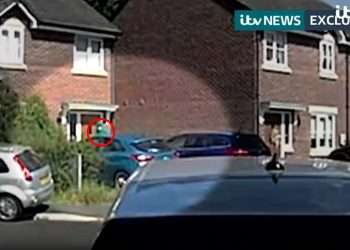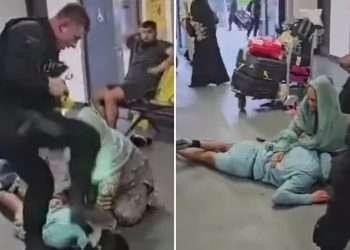A MENTAL health trust had eight chances to prevent Valdo Calocane killing three people but downplayed his danger to the public, a damning report reveals.
And medics lost track of the paranoid schizophrenic even though, when he was taken to a mental hospital, a psychiatrist warned he might “end up killing someone”.

A mental health trust had eight chances to prevent Valdo Calocane killing three people, a damning report revealed[/caption]

By September 2022, his treatment had consistently failed and officials were unable to find him[/caption]
The report says mental health teams then missed a string of chances to stop him between 2020 and 2022 by downplaying his threat in the separate risk assessments.
They “minimised or omitted” key details that he was refusing to take his medication and was having ongoing and persistent symptoms of psychosis.
By September 2022, his treatment had consistently failed and officials were unable to find him.
But instead of raising the alarm Nottinghamshire Healthcare NHS Foundation Trust (NHFT) simply took him off the books by discharging him — without a plan or a final risk assessment.
Calocane was sent back to the care of a GP the day after he failed to appear in court, the Care Quality Commission report said.
Just nine months later, he ambushed students Barnaby Webber and Grace O’Malley-Kumar, both 19, and school caretaker Ian Coates, 65, in the street in Nottingham, stabbing them to death.
The “potential to kill” warning emerged yesterday ahead of Calocane’s mum Celeste and brother Elias speaking to BBC’s Panorama in an episode broadcast last night.
The family of Calocane said his mental illness was so severe, a psychiatrist warned in medical notes he could “end up killing someone”.
The assessment was from 2020 — but details were only released to them after he was sentenced in January this year.
It came as the final report by the Care Quality Commission into NHFT also revealed a string of failings in Calocane’s care.
The report outlined that the trust initially identified Calocane as a would-be killer — but then bungled his risk assessments up to eight times.
The report found: “While some key risks were identified, risk assessments minimised or omitted key details and did not outline the seriousness and the immediate threat of the risks and the known issues that would increase the risk to himself and others.”
The report revealed the trust lost track of Calocane — hoodwinked by his lies over the phone into believing he was abroad.
At the time they did not even hold an address for him.
But instead of tracking him down, they discharged him.
And they made no plan for how the patient earmarked with the potential to kill should be handled back in GP care.
It reads: “There does not appear to have been an updated risk summary or review of the level of risk before he was discharged from the early intervention in psychosis (EIP) team to the GP in September 2022.
“This was a missed opportunity in highlighting to the GP the risk of him not taking his medicine, and the possibility of him having a psychotic relapse as a result.”
Failed to learn from mistakes
The report also found the trust failed to learn from its own mistakes — letting Calocane leave hospital four times despite a history of failing to take his medication.
It failed to consider upping his dosage or forcing him to have anti-psychosis drugs by injection that would have lasted far longer, the report says.
And it also states: “It is evident that VC’s risk of violence, and in turn the risk this posed to others, increased when his psychosis was not managed by medicine.
“However, it appears that VC did not engage with therapies that could help him manage his condition and problems with him taking his medicine were recorded from early on.”
The report also says information from Calocane’s family “was not consistently acted on”.
It concluded “there was no single point of failure, but a series of errors, omissions and misjudgments in all these areas”.

Calocane ambushed students Barnaby Webber and Grace O’Malley-Kumar, both 19[/caption]

Calocane was sent back to the care of a GP the day after he failed to appear in court[/caption]

Calocane’s mum Celeste and brother Elias speaking to BBC’s Panorama in an episode broadcast[/caption]
A statement from the families of the three victims, said: “This report demonstrates gross, systematic failures in the mental health trust in their dealings with Calocane, from beginning to end.
“Clinicians involved at every stage of Calocane’s care must bear a heavy burden of responsibility for their failures and poor decision-making. Sadly, this is the first of what we expect to be a series of damning reports concerning failures by public bodies in the lead up to the killings of our loved ones, and beyond.
“We were failed by multiple organisations pre and post June 13 2023.”
After the publication, Chris Dzikiti, CQC’s interim chief inspector of healthcare, declared more needed to be done to “provide better protection for the public in the future”.
He said: “This review identifies points where poor decision-making, omissions and errors of judgments contributed to a situation where a patient with very serious mental health issues did not receive the support and follow up he needed.
“While it is not possible to say that the devastating events of 13 June 2023 would not have taken place had Valdo Calocane received that support, what is clear is that the risk he presented to the public was not managed well and that opportunities to mitigate that risk were missed.
“For the individuals involved, their families and loved ones, the damage cannot be undone.
“However, there is action that can, and must, be taken to better support people with serious mental health issues and provide better protection for the public in the future.”
For the individuals involved, their families and loved ones, the damage cannot be undone.
The report made a string of recommendations for the trust — including considering “the circumstances surrounding discharge and whether discharge is appropriate”.
It was also told to review its treatment plans for people with schizophrenia regularly and engage patients’ families in all aspects of care and treatment.
NHS England was told to produce new guidance for handling complex psychosis patients such as Calocane within the next 12 months — including a review on when long-lasting injections should be given.
A spokesman for Nottinghamshire Healthcare NHS Foundation Trust responded to the report: “We have a clear plan to address the issues highlighted and are doing everything in our power to understand where we missed opportunities and learn from them.”


































